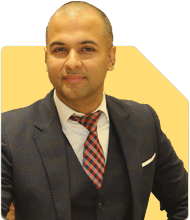Harsh Bharwani | Answer |Ask -Follow
Entrepreneurship Expert - Answered on Jul 04, 2023
As CEO and managing director, he leads the international business and employability initiatives at the computer networking institute, Jetking Infotrain Limited.
After graduating from Delhi University, Bharwani joined the family business in 2010 and set up operations in the US and Vietnam.
He has trained over three lakh students in employability, confidence and key life skills.... more

Hello Sir, I want to start imparting education on financial market online and offline as well. Will it be a good proposition off late where lot of contents are freely available for consumption on social media platforms?
1. Unique Perspective and Expertise: Even though there is a lot of information available online, your unique perspective, expertise, and teaching style can attract learners who resonate with your approach. Providing valuable insights, practical examples, and personalized guidance can differentiate your educational offerings from the generic content available.
2. Credibility and Trust: Building credibility and trust with your audience is crucial. Establishing yourself as an authority in the field by demonstrating your knowledge and expertise can make learners more likely to choose your courses over the vast array of content available on social media.
3. Structured Learning Experience: Many learners prefer a structured learning experience that progresses in a logical and organized manner. By designing comprehensive courses or programs, you can provide a step-by-step learning journey, ensuring learners gain a solid foundation and develop a deep understanding of the financial market.
4. Interactivity and Personalization: One advantage of online and offline education is the ability to engage with learners directly. Offering interactive elements such as live Q&A sessions, case studies, quizzes, or one-on-one coaching can enhance the learning experience and provide value beyond what freely available content can offer.
5. Targeted Audience: Identify your target audience and their specific needs. Tailor your content to address their pain points, challenges, and goals. By focusing on a niche within the financial market, you can attract learners who are specifically interested in that area and willing to invest in specialized education.
6. Marketing and Branding: Establishing a strong brand and marketing your educational offerings effectively is essential. Develop a professional website or platform to showcase your courses, testimonials, and success stories. Leverage social media platforms, email marketing, and partnerships to reach your target audience and build a community around your educational brand.
7. Continuous Learning and Adaptation: The financial market is constantly evolving, so it's crucial to stay updated with the latest trends, regulations, and strategies. Continuously improving and adapting your courses based on market changes will help you provide relevant and valuable education.
Remember, while there is a wealth of free content available, many individuals still prefer structured, expert-led, and personalized learning experiences. By offering unique perspectives, establishing credibility, and providing value beyond what is freely available, you can create a successful proposition in the financial market education space. Good luck with your endeavors!
You may like to see similar questions and answers below
Patrick Dsouza |1429 Answers |Ask -Follow
CAT, XAT, CMAT, CET Expert - Answered on Apr 13, 2024
Patrick Dsouza |1429 Answers |Ask -Follow
CAT, XAT, CMAT, CET Expert - Answered on Jul 18, 2024
Nayagam P P |10859 Answers |Ask -Follow
Career Counsellor - Answered on Dec 26, 2024
Samraat Jadhav |2514 Answers |Ask -Follow
Stock Market Expert - Answered on Jun 09, 2025
Ramalingam Kalirajan |10906 Answers |Ask -Follow
Mutual Funds, Financial Planning Expert - Answered on Dec 19, 2025
Nayagam P P |10859 Answers |Ask -Follow
Career Counsellor - Answered on Dec 19, 2025
Ramalingam Kalirajan |10906 Answers |Ask -Follow
Mutual Funds, Financial Planning Expert - Answered on Dec 19, 2025
Ramalingam Kalirajan |10906 Answers |Ask -Follow
Mutual Funds, Financial Planning Expert - Answered on Dec 19, 2025
Ramalingam Kalirajan |10906 Answers |Ask -Follow
Mutual Funds, Financial Planning Expert - Answered on Dec 19, 2025
Radheshyam Zanwar |6751 Answers |Ask -Follow
MHT-CET, IIT-JEE, NEET-UG Expert - Answered on Dec 19, 2025
Radheshyam Zanwar |6751 Answers |Ask -Follow
MHT-CET, IIT-JEE, NEET-UG Expert - Answered on Dec 19, 2025
Samraat Jadhav |2514 Answers |Ask -Follow
Stock Market Expert - Answered on Dec 18, 2025
Reetika Sharma |432 Answers |Ask -Follow
Financial Planner, MF and Insurance Expert - Answered on Dec 18, 2025
Reetika Sharma |432 Answers |Ask -Follow
Financial Planner, MF and Insurance Expert - Answered on Dec 18, 2025























